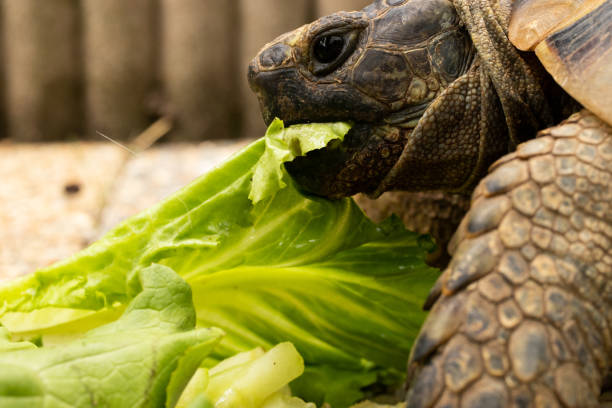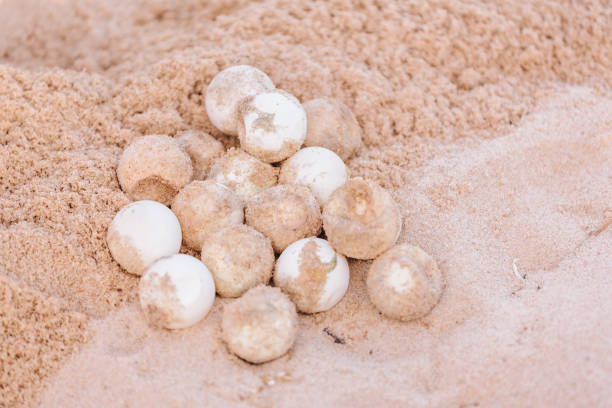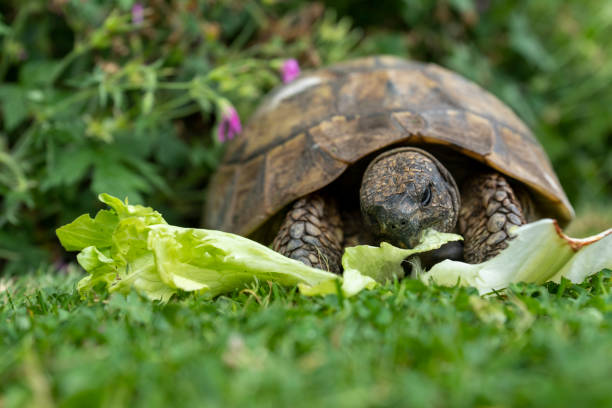Tortoise Diet and Nutrition
Tortoises require a wide range of energy-providing nutrients. These can be provided in the form of carbohydrates, proteins or fats.
Giant sulcata tortoises enjoy grasses and weeds like alfalfa, hibiscus leaves and prickly pear cactus (Opuntia). A sprinkle of calcium powder helps to ensure their bones stay strong. Avoid feeding them purely sweet fruit and corn as these can cause intestinal parasites.
Vegetables
The tortoise diet must be comprised of low protein, high fiber foods containing a balanced ratio of calcium to phosphorus. It should include a variety of leafy greens, fruits and flowers.
In nature, tortoises eat a wide variety of plants including berries, flowers, grasses and vegetables – in particular, alfalfa leaves, apple, beans (runner and French), dandelion, carrots, kale, lettuce, spinach and turnips.

A tortoise’s diet should contain a good supply of water which can be obtained from consuming the food items or by offering fresh clean water in a shallow bowl. It is also important that it contains no chemicals that interfere with the absorption of nutrients such as oxalates.
Fruits
The tortoise digestive system is not geared towards digesting large quantities of fruit and so their inclusion should be limited. However, the occasional berry is not harmful and provides a good source of vitamins.
A tortoise needs lots of calcium to maintain a strong shell. It is best to get this from dark leafy greens rather than berries, but a powdered reptile calcium supplement can be useful. Seek your vet’s advice on the correct dosage for your tortoise.

In the wild, tortoises will also drink during episodes of rainfall from puddles and they will often approach streams and ponds to pass urine. This is a natural way to regulate hydration.
Meat
In the wild, tortoises spend a lot of time foraging for food and they are typically herbivores.
For this reason, it is important to make sure that your tortoise only consumes foods that are low in protein. This will help to avoid metabolic bone disease, high oxalate levels and excess growth.
A good tortoise diet should consist of a mixture of short hay, fresh vegetables and a complete pelleted food formulated for reptiles (and tortoises). Avoid feeding foods that are high in protein as these can cause harm to the tortoise.
Nuts
In the wild, tortoises graze on plants that provide low protein and fat and high levels of raw fibers, minerals and vitamins. The plants also have a high calcium to phosphorus ratio.
In captivity, tortoises can be fed the same way as they eat in the wild. The diet should be well-balanced with a moderate level of proteins, fats, sugars and carbohydrates and high levels of fibre and calcium.
A healthy diet for tortoises includes a variety of foods and should include herbivorous food like grasses, weeds, flowers and leaves as well as commercial tortoise feed. Fruits can be added as a treat but should not make up more than 10% of the diet. Avoid foods that contain oxalic acid and goitrogens which bind with calcium and prevent the body from absorbing it.
Seeds
Most tortoises, particularly the Hermann’s, Greek and Marginated species, are exclusively herbivores. The protein they need is available from the flowers, leaves and seeds that they graze on in the wild.
Seeds should be fed sparingly and only if they have been properly washed to remove any pesticides or other contaminants. Avoid ‘garden variety seeds’ and any that contain high levels of oxalic acid or goitrogens (brassica family plants).
Dried salad style hay is a good source of fibre and can be mixed with the pelleted diet, but only as a very minor part of the total diet. It is important that the diet is sufficiently varied and rich in natural trace elements, such as soluble calcium, to prevent serious deficiency.
Eggs
The diet of Testudo species is a complex subject. Whole books have been written on the topic and getting it right necessitates a good understanding of the tortoise’s natural environment and food chemistry.

As herbivores, Testudo species require little protein. Any animal based feed should be fed sparingly and no more than 5% of the total diet. Ideally the protein should come from plant based foods such as greens, flowers and hays. Too much animal protein has been shown to cause fatty liver disease. It is also important to avoid high sugar foods, like fruits and corn, especially in young tortoises as they can predispose the desert species to intestinal parasites.
Milk
Providing a wide variety of foods is the key to proper tortoise nutrition. Wild tortoises are browsers that consume a large variety of seasonally available plants. This diet changes from a high moisture and protein content in early spring to a very dry, low-protein, and high-fiber content during the long hot summers experienced by desert habitat species.
Home prepared diets should include collard greens, kale, other leafy greens and lettuces, zucchini (courgettes), carrot (cooked or grated) and a small amount of fruits such as apples and pears and Opuntia ficus-indica cactus (prickly pear or mission cactus). Baby tortoises should be fed AM and PM to simulate their natural eating pattern.
Water
A desert tortoise’s diet needs to be carefully planned for and supervised. Diets that have a low Ca:P ratio and high % dry matter can lead to shell deformities and kidney/bladder problems.
The frequency of feeding should be planned based on the tortoise’s growth pattern. A general rule of thumb is to feed all they can eat in 20 minutes once a day.
It is recommended that tortoises get 5% or less of their protein from animal sources (earthworms, night crawlers, crickets, slugs, snails with shell). Green vegetables should make up the majority of the diet and can include kale and melon. The tortoise should also have access to fresh drinking water on a daily basis.
Calcium Powder
In nature Tortoises naturally consume a variety of calcium sources including discarded snail shells, limestone rock pieces and egg shell pieces. These are more beneficial than feeding a commercial calcium powder which often contains phosphorous and can lead to nutritional imbalances (see below).
Reptiles need to eat energy-providing nutrients such as proteins, carbohydrates and fats. Minerals and vitamins are also important but are not a source of energy. Reptiles are opportunistic feeders and their diet should therefore include a variety of foods. Nevertheless, many captive tortoises develop nutrition-related diseases suggesting that the basic ration they are being fed is fundamentally inadequate.

